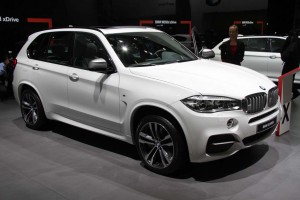
BMW's 2014 X5 continues to set the pace for luxury SUVs and brought in big profits to the maker in the third quarter.
BMW AG’s profits fell slightly in the in the third quarter despite strong sales of its vehicles, particularly its X5 sport-utility vehicle made in South Carolina. The company sold 509,669 cars worldwide, an increase of 5.8%.
The Bavarian automaker’s net profit dropped 1.2% in the quarter due to non-cash losses on foreign currency hedges and the reduced value of a stake in a key supplier. The company is saying it expects to be more profitable this year than it was last year.
Net profit of 1.31 billion euros ($1.64 billion) for the third quarter ending Sept. 30 fell short of analyst expectations for 1.36 billion euros, reported by the Associated Press.
The company’s operating earnings jumped 17.1% to 2.25 billion euros ($2.8 billion), excluding interest and taxes. BMW’s revenue leapt 4.5% to 19.6 billion euros and its profit margin improved to 9.4% from 9%.
(To see TDB’s first look at the 2015 BMW X5 M and X6 M, Click Here.)
In addition to the jump in the X5, the Munich-based company has seen a 3.4% increase in sales of its 3-Series sedan through September. However, the sales of the X5, which sells for $52,800-$68,200 in the U.S., is important because the profit margins on the SUV are higher than those for it’s lower priced vehicles.
(Click Here for details about the passing of Tom Magliozzi.)
Conversely, BMW’s i3 hatchback hasn’t been the hot seller the maker had hoped for with just 10,199 vehicles sold through September. The automaker’s optimistic about the car though, suggesting that sales would have been higher but production constraints limited supply. In February, BMW said it had received “more than 11,000 orders” for the all electric i3 hatchback.
(Asia showing substantial interest in autonomous vehicle technology. For more, Click Here.)
“Expenditure on new technologies will remain high throughout the remainder of the year. One important factor driving this trend is the need to develop new technologies aimed at bringing down CO2 emissions even further,” the company said in a statement.
The company’s financial hits came from a tax bill that was 40 million euros higher than last year as well as a charge taken for the reduced value of its stake in SGL Carbon, maker of advanced carbon-fiber materials used to cut vehicle weight in BMW’s i3 and i8 models. It also took a non-cash charge for losses on foreign currency hedges intended to shield revenues from exchange rate fluctuations.
